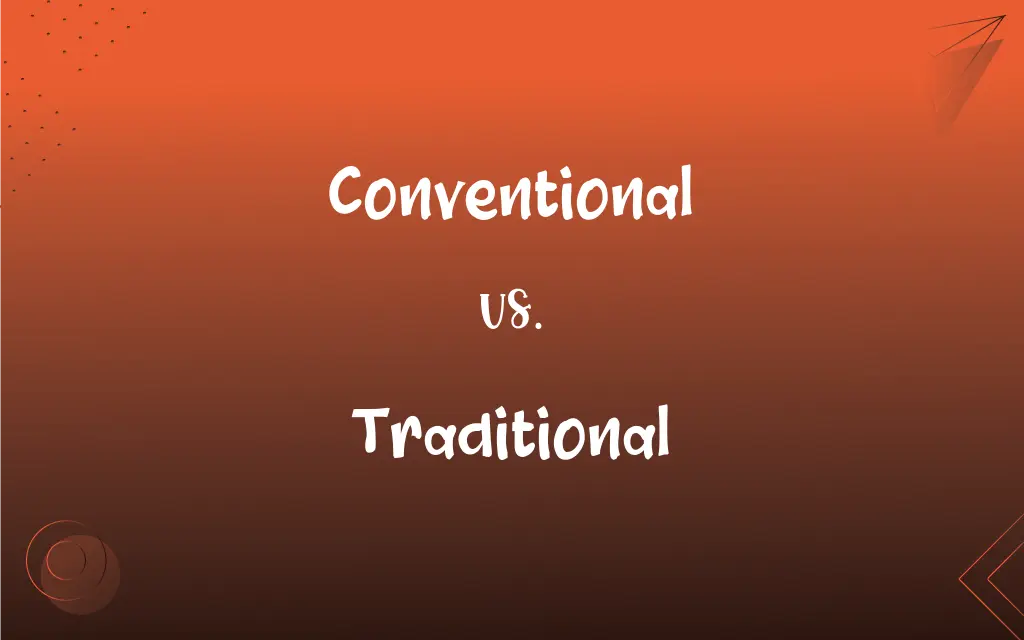Conventional vs. Traditional: What's the Difference?
Edited by Aimie Carlson || By Harlon Moss || Updated on October 10, 2023
Conventional refers to what is common or customary, while traditional relates to beliefs or customs transmitted through generations.

Key Differences
Conventional implies adherence to widely accepted and practiced standards, norms, or methods. Traditional pertains to customs, beliefs, and practices passed down through generations, preserving the cultural or familial continuity. Both are associated with established practices, but conventional tends to lean towards current or modern norms, whereas traditional is bound to historical or ancestral practices. Therefore, while both signify adherence to some form of established norms or practices, the timeframe and basis of these practices distinctly define each term.
Conventional practices often stem from a broad consensus in a contemporary context, reflecting what is popularly accepted and utilized in the present moment. Traditional practices, conversely, find their roots in the past, often perpetuated through familial or cultural lines for their inherent values or beliefs. The latter doesn’t merely address what is commonly done but also encapsulates the sentiments, values, and reverence associated with age-old practices. It’s also crucial to understand that what is conventional in one era may become traditional if it withstands the test of time and is passed along generations.
The conventional is often pragmatic, focusing on efficiency and practicality, and is subject to change with evolving societal norms or technological advancements. Traditional, while not immune to change, is somewhat more resistant to it because it’s tied to cultural, familial, or historical significance, thus making any alterations more careful and deliberate. While conventional methods may quickly adapt to societal developments or innovations, traditional methods may retain their original form to preserve their intrinsic or symbolic value.
Conventional, in its essence, doesn’t require historical allegiance and is more adaptable, often reshaping itself in alignment with prevalent societal norms or technological advancements. Traditional, in contrast, often carries a sense of historical, cultural, or emotional weight, which is considered valuable and worth preserving, even in the face of modernity. Both, while serving to establish a pattern or method in societal or personal contexts, differ significantly in their origin, development, and adaptability to change.
Comparison Chart
Basis
Current norms and practices
Historic/customary practices
ADVERTISEMENT
Flexibility
Generally more adaptable
Tends to be more resistant to change
Timeframe Reference
Present-oriented
Past-oriented
Emotional/Cultural Weight
Usually less
Usually more
Dependence on Ancestry
Not necessarily reliant
Typically reliant
Conventional and Traditional Definitions
Conventional
In terms of methodology, conventional refers to standard, recognized methods.
The scientist used a conventional technique to conduct the experiment.
ADVERTISEMENT
Traditional
Traditional refers to practices passed down through generations.
The traditional recipe has been in our family for decades.
Conventional
Conventional pertains to widely accepted and utilized practices.
He chose a conventional route to solve the mathematical problem.
Traditional
In the cultural sense, traditional pertains to customs inherent to a specific culture or society.
The traditional dance told a story of the community's history.
Conventional
In behavior, conventional implies adherence to societal norms.
Her conventional manners were appreciated at the formal dinner.
Traditional
Traditional can describe beliefs grounded in historical or ancestral precedents.
Traditional medicine in some cultures employs herbs and rituals.
Conventional
In style or form, conventional means following established models or patterns.
The artist decided against a conventional style, opting for more abstract work.
Traditional
Traditional may imply adherence to historical forms or styles in art, music, etc.
The musician studied traditional Irish folk tunes.
Conventional
In agreements, conventional relates to common, accepted understandings or treaties.
The countries entered into a conventional agreement to promote trade.
Traditional
It can also relate to ideas and concepts preserved from the past.
Traditional classrooms often feature a teacher in front of students.
Conventional
Based on or in accordance with general agreement, use, or practice; customary
Conventional symbols.
A conventional form of address.
Traditional
Of, relating to, or in accord with tradition
A traditional wedding ceremony.
Conventional
Conforming to established practice or accepted standards; traditional
A conventional church wedding.
Traditional
Of, relating to, or derived from tradition.
This dance is one of the traditional customs in the area.
I think her traditional values are antiquated.
FAQs
What does conventional mean?
Conventional refers to widely accepted, followed, or utilized practices or norms.
Can conventional practices vary between cultures?
Yes, what's conventional can depend on cultural, societal, or industrial norms.
Is something conventional always popular?
Generally, yes; conventional implies something is widely accepted or used.
Does traditional always refer to ancient practices?
Not always ancient, but traditional practices have historical or ancestral roots.
Can a conventional practice become traditional?
Yes, if a conventional practice continues and is passed down through generations.
Is a conventional approach always the best approach?
Not necessarily; the best approach depends on the specific context and goals.
Can a new practice be termed traditional?
Generally, no; traditional implies a connection to the past and ancestral transmission.
What defines a traditional practice?
Traditional practices are customs, methods, or styles passed down through generations.
Can something be both traditional and conventional?
Yes, if a traditional practice is still widely followed, it can be conventional too.
Are traditional beliefs always religious?
No, traditional beliefs can be cultural, societal, familial, or religious.
Can a technology be conventional?
Yes, if a technology is widely adopted and recognized as a standard, it's conventional.
Can traditional practices be harmful or negative?
Yes, some traditional practices might be criticized or reassessed for their impact.
Is a conventional method always proven scientifically?
Not always, but conventional methods often align with recognized and practical approaches.
Are all conventional practices ethical?
Not necessarily; the ethics of a conventional practice can depend on cultural and societal norms.
Can traditional practices change over time?
Yes, they can evolve, but they often retain core elements to preserve their essence.
Do conventional practices always follow logic?
Generally, they often follow prevalent logical or pragmatic approaches but not always.
Is every tradition based on factual history?
Not always; some traditions may evolve from myths, stories, or symbolic acts.
Can traditions be created in the present?
Traditions generally start at some point, but genuine traditions have historical roots.
Can conventional methods exist in art?
Yes, conventional can refer to established, recognized styles or techniques in art.
Can traditions be forgotten over time?
Yes, traditions can fade or transform, especially without deliberate preservation.
About Author
Written by
Harlon MossHarlon is a seasoned quality moderator and accomplished content writer for Difference Wiki. An alumnus of the prestigious University of California, he earned his degree in Computer Science. Leveraging his academic background, Harlon brings a meticulous and informed perspective to his work, ensuring content accuracy and excellence.
Edited by
Aimie CarlsonAimie Carlson, holding a master's degree in English literature, is a fervent English language enthusiast. She lends her writing talents to Difference Wiki, a prominent website that specializes in comparisons, offering readers insightful analyses that both captivate and inform.































































